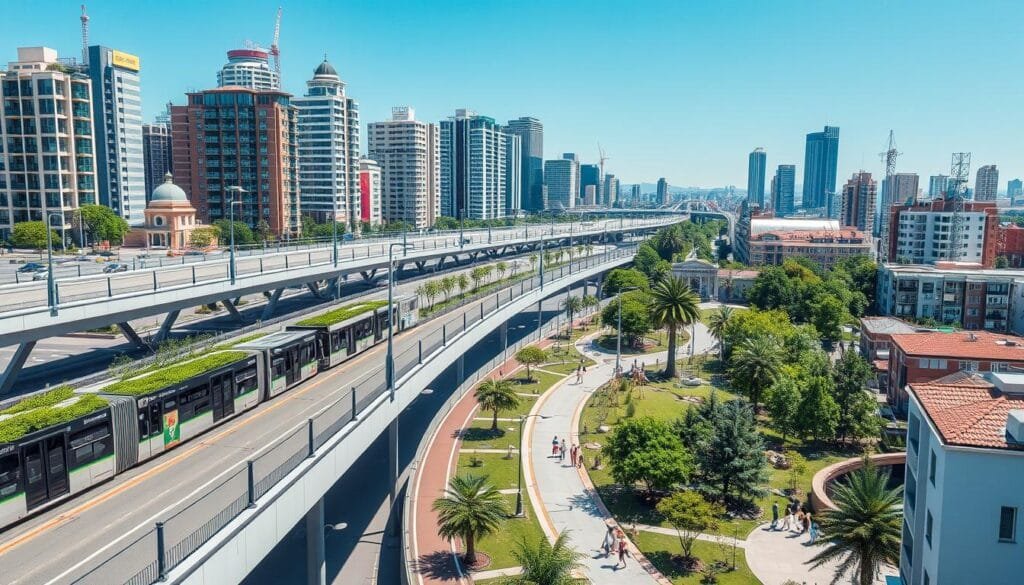Taxes play a crucial role in supporting economic equality and sharing wealth fairly. The gap between rich and poor affects everyone’s growth. The United Nations points out that fighting inequality helps reduce poverty and increase harmony. So, higher taxes, like wealth taxes, are suggested to lessen this gap.
Through progressive taxation, the rich pay more, which is fair. For example, Couple A earns $75,000 and pays $15,000 in taxes, leaving $60,000. Couple B earns more, $150,000, and pays $45,000, leaving them $105,000. This way, wealth gets redistributed, making things easier for those with less.
Jobs often show how women undervalue themselves. Education also adds to wealth gaps. The Bill and Melinda Gates Foundation and The Citizens Foundation strive to address these issues. Groups like the IMF and World Bank also play a key role in fighting these inequalities.
Key Takeaways
- Higher taxes are essential for promoting economic equality and wealth redistribution.
- Progressive taxation helps balance the financial burden between different income brackets.
- Global education imbalances exacerbate wealth disparities; hence, support from educational foundations is vital.
- International organizations like the IMF and World Bank contribute significantly to mitigating inequality.
- Real-life examples and statistics underline the importance of higher taxes for societal benefits.
The Role of Higher Taxes in Reducing Inequality
To reduce economic inequality, we need smart strategies. Higher taxes are crucial for lessening the income gap. A shocking 70% of people worldwide suffer from rising inequality, the United Nations reports. To address this, governments are looking at wealth taxes to achieve economic fairness.
Addressing Wealth Disparities
Economic inequality is a big problem for policymakers around the globe. In the Philippines, wealth is mostly held by just a few. In 2012, only 25 of the 40 richest Filipinos were listed as top taxpayers. There’s a clear need for wealth taxes to distribute income fairly. Targeting the rich can help reduce wealth gaps and include everyone in the economy.
Implementing Wealth Taxes
Wealth taxes are working in some places. Take the U.S., where the tax system charges high earners more, helping to lower income inequality. The U.S. has tax rates from 10% to 37% for different income levels. More countries adopting this approach could greatly reduce economic imbalances.
Support from International Organizations
International organizations like the World Bank and the IMF support wealth taxes. They see progressive taxes as key in fighting global inequality. Their endorsement highlights the need for global cooperation in this effort. Thanks to the World Bank and IMF, wealth taxes could help establish fairer tax systems worldwide.
| Country | Wealth Tax Rate (%) | Income Tax Brackets |
|---|---|---|
| United States | 0 | 10% – 37% |
| Norway | 0.85 | 1.9% – 38.2% |
| Switzerland | 0.3 – 1 | 0.77% – 36% |
Impacts of Higher Taxes on Social Welfare Programs
Higher taxes can greatly improve social welfare programs. Taxes like those on healthcare and education let the government fund these areas better. This leads to a more fair society for everyone.
Supporting Healthcare and Education
Taxes for healthcare and education are crucial. They help medical facilities give better care and reduce waiting. They also help schools and universities provide a better education. More money in these areas can create a healthier, smarter workforce. This then helps the economy grow.
Enhancing Social Security
Higher taxes also help make social security stronger. As we have more elderly people, a strong social security system is key. Tax money used here ensures that retirees and those in need get enough financial help. This supports not just individuals but our society’s stability too.
Research suggests that individuals with lower incomes are more sensitive to changes in income compared to higher-income individuals when it comes to consumption.
| Program | Funding Source | Impact |
|---|---|---|
| Healthcare | Healthcare Tax | Improved patient care, reduced wait times |
| Education | Education Tax | Enhanced educational outcomes, better facilities |
| Social Security | General Taxes | Increased financial support, stability for retirees |
Higher Taxes and Economic Development
The link between higher taxes and economic growth is complex. Higher taxes can fuel debate. But their importance in paying for infrastructure, helping businesses grow, and funding public services is clear.
Funding Infrastructure Projects
Infrastructure investment is key for economic progress. In 1997, the Forest Service spent $140 million on roads in national forests. This was mainly for the logging industry. Such investments lead to more jobs and better logistics. They help big businesses and local communities alike, making life better for everyone.

Promoting Business Investment
It’s surprising how much tax money goes to help businesses grow. For example, in 1997, Fortune 500 companies made $325 billion. Nearly $100 billion of this was from government subsidies. Companies like General Electric got $20.1 million in grants in 1996, even with huge profits. These grants help companies innovate, grow, and boost the overall economy.
Supporting Public Services
Higher taxes are crucial for funding public services too. The Rural Electrification Administration and Power Marketing Administrations give $2 billion a year to big electric utility cooperatives. This includes companies like ALLTEL that are already making money. These subsidies help keep essential services affordable for everyone. This supports our society and helps communities flourish.
| Company | Grants Received (1996) | Profits (1996) |
|---|---|---|
| General Electric | $20.1 million | At least $500 million |
| Rockwell International | $25.4 million | |
| Westinghouse Electric | $26.1 million |
So, it’s clear that well-managed higher taxes can really push economic growth. They do this by investing in infrastructure, helping businesses, and funding public services well.
Is Wanting Higher Taxes for More Perks in Society Bad?
The debate on tax increase is important. It asks if wanting higher taxes for better societal perks is bad for us. Critics feel such desires could hurt our economy and reduce motivation for business owners. Yet, supporters believe higher taxes mean better public health and schools. These improve life quality.

States like Florida and Texas, without an income tax, drew 285,000 new residents in 2018, IRS data shows. This fact is part of the tax debate. It shows how tax laws affect where people move. But, these states saw job growth lag behind population increase. They lean on property and sales taxes, which hit lower-income folks harder.
A study from the University of Chicago Law School connects happiness with tax levels. It suggests happiness ties more to societal standing than to just money. Greater happiness could result from better healthcare and schools, funded by higher taxes.
In the tax debate, looking at the big picture is crucial. Consider South Dakota and Wyoming, where education sees minimal funding due to low taxes. In contrast, New Hampshire shows high education costs with little state funding. This illustrates low-tax policies can lead to poor public services.
| State | Income Tax | Education Spending | Employment Growth |
|---|---|---|---|
| Florida | No | Moderate | Below population growth |
| South Dakota | No | Lowest | Below population growth |
| New Hampshire | No | Lowest in Higher Ed | Below population growth |
| Texas | No | Moderate | Below population growth |
The Joint Committee on Taxation (JCT) shows tax burden differences across incomes. But, their stats may be incomplete or misleading. This makes the real impact of tax changes hard to see. Policymakers have to wade through this to create fair taxes. Taxes should help society, boost the economy, and be fair for everyone.
Arguments Against Higher Taxes
Talking about the upsides of higher taxes is common, but we should also look at the downsides. These include worries about growth, motivation for entrepreneurs, and the risk of tax evasion. It’s important to think about these points carefully.
Concerns About Economic Growth
Higher taxes can lead to worries about the economy, particularly in how they affect what people have to spend. The 1991 luxury tax on pricey boats, cars, and jewelry had a 10% rate for boats costing over $100,000. This tax was dropped due to job losses in yacht making.
This situation shows that high taxes can hurt certain industries. This damage can slow down the entire economy. It shows why we must be cautious with tax increases.
Impact on Entrepreneurial Motivation
Raising taxes can make it harder for entrepreneurs. For example, Donald Trump’s tax changes let people and businesses deduct the full price of new or used private jets from their taxes. This was meant to encourage investment.
But without such benefits, the drive to start new projects could lessen. Deducting jet costs can lead to more personal trips at no tax cost, seen as a bonus for business heads. These perks help keep businesses active and the economy moving.
Potential for Tax Evasion
The higher the taxes, the more likely people will try to avoid them. For example, New York City has faced criticism for taxing expensive condos less than average homes in Queens. This unfairness can increase tax evasion methods.
The U.S. lacks some taxes on luxury items, unlike places like Venezuela, where taxes aim to benefit society more evenly. Finding the right tax laws that stop evasion without hurting innovation is a tough but important task.
Understanding the impacts of income differences and how they spread through the community requires deeper exploration. A great resource for this is a study on income inequality.

Successful Examples of Higher Taxation Models
Looking at tax success stories, the Nordic model and U.S. highways shine. These examples have found a sweet spot between high taxes and social perks.
Insights from Nordic Countries
Countries like Sweden, Denmark, and Norway showcase a progressive tax system. This system supports strong social safety networks. High taxes on income and wealth fund their health and education services.
Nordic nations achieve a high standard of living with these policies. They balance equitable taxes and high-quality life for their citizens. This approach shows how fairness and efficiency can coexist, benefiting everyone.
Case Study: U.S. Interstate Highway System
The U.S. highway system demonstrates targeted taxes’ role in building infrastructure and growth. It’s funded by a federal fuel tax, linking the entire nation and boosting trade.
- Federal Fuel Tax: This tax supports the roadways that keep America moving.
- Economic Impact: By improving travel, it helps trade and creates jobs.
- Societal Benefits: Good roads mean better access to schools, hospitals, and more.
This side-by-side review highlights their tax strategies’ impact:
| Aspect | Nordic Tax Model | U.S. Highway System |
|---|---|---|
| Primary Objective | Reduce inequality through progressive taxation | Enhance infrastructure through targeted taxes |
| Key Benefit | High living standards and universal social welfare | Improved connectivity and economic growth |
| Funding Mechanism | Income and wealth taxes | Federal fuel tax |
The Nordic model and the U.S. highways tell a story of tax policy success. They show us how the right taxes can lead to benefits for society and the economy. This comparison offers lessons on designing taxes that build a better world for all.
Conclusion
We’ve looked at how higher taxes can help society and lead to economic fairness. With the right tax plans, we can fix wealth gaps, support social welfare, and pay for important projects. This makes society more fair and wealthy.
Talking about how higher taxes might lower the drive to innovate or slow economic growth needs careful thought. Good tax policies can push economic growth. They support public services and lessen inequality. This creates a stronger consumer market and a better-trained workforce. Looking at Nordic countries shows us that smart taxes can improve society without harming innovation.
To get the best out of our tax policies for society and fairness, we must keep researching and talking about it. Learning from what works and adapting tax systems to meet our unique needs is key. We aim for growth that benefits everyone equally. Let’s work together on tax plans that help everyone and build a stronger community.
FAQ
How do higher taxes promote a more equitable society?
Higher taxes, like wealth taxes, help spread wealth more evenly. They lower pressure on those in need. This makes a fairer society by reducing the wealth gap.
Groups like the United Nations, the World Bank, and the IMF back this idea.
What role do higher taxes play in addressing wealth disparities?
Progressive taxes, especially on wealth, fight growing global inequality. These taxes ensure fairer distribution of public funds across society.
Are there any international organizations that support higher taxes?
Yes. The World Bank and the International Monetary Fund (IMF) favor progressive taxes. They see them as key in fighting economic inequality.
How do higher taxes impact social welfare programs like healthcare and education?
More taxes boost funds for crucial social programs. This improves access to healthcare and education, supporting our society’s health and success.
Can higher taxes bolster social security systems?
Yes, they can strengthen social security, aiding our older population. This helps ensure a better life quality for them.
How do higher taxes contribute to economic development?
Taxes fund important projects that energize the economy. They create jobs and better business conditions by boosting necessary public services.
Is desiring higher taxes for more societal perks detrimental?
Opinions vary on this. Some say high taxes might hurt business growth and widen economic gaps. Others highlight the benefits for public health, education, and life quality.
What are the key criticisms of higher tax regimes?
Critics argue they might slow economic growth and dampen business innovation. There’s also the risk of more people trying to avoid taxes. Balancing strict taxes and fostering innovation is quite a challenge.
Are there successful examples of higher taxation models?
Nordic countries demonstrate the success of high-tax systems, boasting strong social support and high living standards. In the U.S., taxes have funded major projects like the Interstate Highway System, showing the positive impact of well-used tax money.
